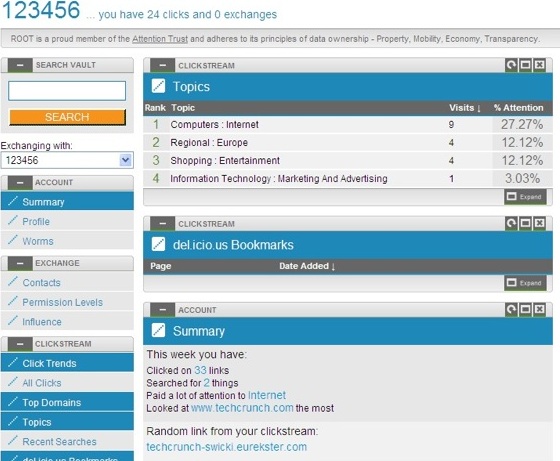Entrepreneur Seth Goldstein announced today that his company ROOT has received $1 million in funding from the Chicago Board of Trade (CBOT), a futures exchange founded in 1848. Bernard W. Dan, CEO of the Chicago Board of Trade, will join the board of directors at ROOT.
ROOT is a commodities exchange for Internet- generated consumer leads. Today they provide a service that applies quality standards to mortgage service lead sellers wishing to sell their leads to mortgage service providers.
Far more interesting, though, is their experimental service ROOT.net, a virtual vault for managing attention data (browsing, search history and potentially much more – see partial screenshot at the bottom of this post). In the future, ROOT is likely to offer chunks of attention data that consumers have chosen to expose to prospective buyers in a futures market. It’s very experimental, but I think it’s fascinating. Though ROOT.net is in its infancy today, I think it’s the most important part of ROOT. The news that CBOT has invested in the company and its CEO has joined its board is a very important validation of the Attention Data concept.
ROOT.net lets users manage data captured by the Firefox plug-in from the nonprofit AttentionTrust, which ROOT founder Goldstein also helped found. That plug-in allows you to save your attention data as an xml file on your own computer or store it on the servers of any number of third party services, such as ROOT. See the partial screenshot at the end of this post for a look at the ROOT.net dashboard.
The likely future of the company is that ROOT will sell access to the parts of that attention data that we chose to expose and we’ll receive either part of the profits, discounts from the advertisers who buy it or some other form of compensation. In the case of ROOT, it is most likely not going to be sold in real time but in futures markets. You can already capture your attention data with the AttentionTrust plug-in and manage it with a ROOT Vault, but the company isn’t doing anything with it yet. Users can turn off tracking at any time. As you can see from the image below, there are a number of things you can do already with the service – like use a widget (called a worm) to display your favorite sites on a blog or elsewhere. Keeping track of your web use through a tool like this has a lot of potential already, but ROOT is in a good position to leverage the data you share in a market.
Offering our attention data in a futures market would look like this. Companies would pay now for access later to attention data from people who intend to buy a compact car in California, or who are outdoor recreation enthusiasts with a certain income level. What have those people been doing online as they prepare to make a purchase? The idea is that users will selectively expose that data about themselves in exchange for some benefit to themselves: advertising targeting our intentions instead of sent scattershot at us, compensation for our data or discounts.
Clearly there’s a lot of trust that’s going to need to be built in this sector, but to draw an analogy, we don’t stash our cash under the mattresses anymore – we put it in the bank. We already hand our attention data over to any number of other companies, we just don’t have very much control over it currently and can’t leverage it for our own purposes.
Remember when AOL exposed scores of search queries from users without permission and it was a major crisis? That’s just one example of how valuable control over our own data is to us. Some of it we’ll want to keep private, but much of it we will want to provide to trusted companies to leverage for services we find beneficial. How all of this will play out remains to be seen. The future of the Attention Economy could look like the movie Minority Report where I’m followed by marketing machines that know my consumption history in shocking detail; or it could look like services that provide me with just what I need, when I ask for it.
I hope to be able to use services in the future that take my exposed Attention Data and run it through any number of value added services for my reuse. “Computer, bring me the best articles I’ve read on Attention from the five people I’ve communicated most recently with about the subject.” A futures market for commercial use of that data makes perfect sense to me too, though.
It’s a very complicated and experimental situation. If the Attention Economy goes the direction that some of the key players participating want it to go in, today’s announcement of the CBOT investment in ROOT will likely go down in history as a key event in the emergence of users in control of our data and more widespread appreciation of that data’s worth.
